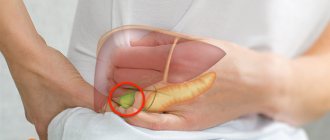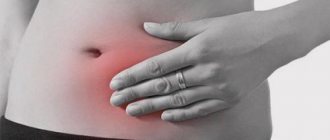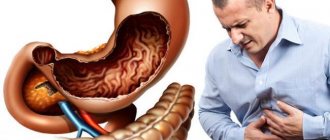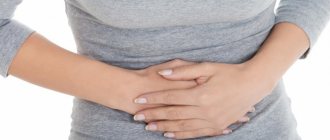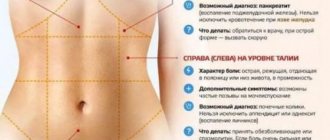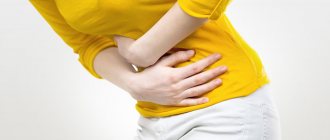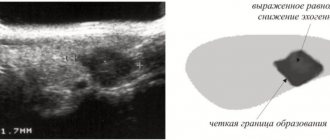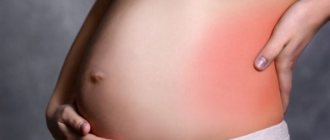Why is my stomach bloated?
Bloating in the lower abdomen causes great discomfort, which is why patients want to get rid of it as soon as possible. The following reasons can cause this condition:
- increased gas formation resulting from poor nutrition;
- dysbacteriosis;
- helminthic infestations;
- intestinal infections;
- disease of the abdominal organs, in which pain can radiate to the lower back;
- pancreatitis, in which patients will experience nausea and vomiting, as well as pain in the left side;
- intestinal obstruction;
- stomach upsets;
- weakened immune system;
- inflammatory processes in the intestines, which cause pain in the right or left lower abdomen;
- neoplasm;
- bad habits, in particular smoking;
- binge eating;
- talking while eating;
- intake of large amounts of air with food;
- dyspepsia – digestive disorder;
- food intolerance.
Poor diet can cause bloating
In women, the pathological process can be the result of the following factors: pregnancy, menstrual irregularities, menopause, endometriosis, uterine fibroids. In men, heaviness and bloating can be caused by prostatitis, the presence of kidney stones, cystitis, and diseases of the genital organs. In children, bloating is caused by overfeeding, a diet that is not appropriate for their age, and neoplasms.
Radiosurgery
Radiosurgical method is one of the types of radiation therapy, in which, using special equipment, high doses of radiation are targeted, causing the death of tumor cells. The aggressiveness and radicality of the method was the reason for its name and its separation into a separate section of radiation therapy. The possibility and feasibility of use for peritoneal tumors is determined individually, taking into account the type of tumor, its size, location, and the possibility of using other techniques.
Diseases that cause bloating
Let's talk about common causes of flatulence.
Neurosis
Intestinal neurosis does not always occur in emotional people; in some cases, the problem occurs in balanced people who are accustomed to keeping their emotions deep in their souls. The disease can be provoked by conflict situations, mental stress, and poor nutrition.
Clinical symptoms of neurosis can be quite varied and largely depend on the stability of the nervous system. Bloating appears after eating and increases during the day. Flatulence is aggravated by pain and cramps. The pain intensifies after eating and in the evening.
Intestinal neurosis often appears against the background of emotional shock
Dysbacteriosis
Dysbacteriosis does not develop in healthy people; it signals trouble in the body. The basis of the pathological process is a change in the composition of microorganisms that inhabit the intestines. As a result, the number of beneficial bacteria decreases, while opportunistic microflora is activated.
Complete digestion of food and protection of the body is simply impossible without the participation of microorganisms that inhabit the intestines. Dysbacteriosis is often caused by uncontrolled antibiotic therapy, intestinal infections, gastrointestinal diseases, poor nutrition, and weakened immunity.
Intestinal obstruction
Intestinal obstruction is an acute pathology, which in terms of danger is equal to appendicitis and perforated gastric ulcer. A delay or even complete absence of passage of feces through the intestines occurs for a number of reasons:
- the presence of foreign bodies, polyps, malignant tumors;
- smooth muscle spasm;
- volvulus of a loop of intestine;
- adhesive process and more.
The first symptom of the pathology is an attack of pain. The abdomen swells after about twelve hours. There is severe vomiting. The main treatment method is surgery.
Radiation therapy
The goal of radiation therapy is to slow tumor growth. Applicability in the treatment of mesothelioma is limited due to the large area of tumor spread, the proximity of other organs and the difficulty of local action. For tumors of other organs that grow into the peritoneum, the advisability of using radiation therapy is determined by the histological type of the tumor and the sensitivity of its tissues to radiation.
Radiation therapy is used both independently and in combination with other treatment methods.
How to recognize flatulence?
Symptoms manifest themselves in different ways, and their appearance is largely due to the immediate causes of flatulence. The following patient complaints indicate problems with the intestines:
- feeling of fullness in the abdomen;
- internal pressure on the stomach and bursting sensations;
- cramps in the abdomen and sharp pain that disappears after the passage of gas;
- discomfort in the epigastric region;
- rumbling in the stomach after eating;
- hiccups, belching;
- constipation or diarrhea.
Sometimes the problem is psychological in nature and appears after stressful situations.
Inguinal hernia: surgery
If the disease is not in an acute period, infringement is not observed, then a regular operation is performed according to the schedule. Before surgical intervention, a detailed examination of the patient’s body condition is carried out, existing permanent diseases are treated in order to neutralize possible complications.
Operation methods:
- Hernia repair (hernioplasty) of an operative nature - can be tension or without tissue tension. In the first case, the patient’s own tissues are used, which are pulled over the area of the hernia protrusion, which creates a duplication in this place. In the second case, a synthetic material (composite or polymer mesh) is used for this purpose.
- Laparoscopic method - the hernia is sutured using special micro-instruments and a camera with minimal trauma to nearby tissues.
The surgical intervention occurs in several stages: first, the hernial sac is isolated and separated from the tissues; then the bag is cut and its contents are removed. Then the bag is cut off and the wall is restored using the plastic method; at the final stage, the resulting wound and the hernial orifice are sutured.
An inguinal hernia on the right rarely recurs. The causes of a new pathology may be incorrectly selected treatment methods, non-compliance with the recommended postoperative regimen, constipation or severe cough, infection of the postoperative suture area. Often the cause of recurrent inguinal hernia in men is an adenoma that was not treated before surgery.
Why does it hurt in the lower abdomen?
In women, the most common cause of nagging pain from below is menstruation. If an unpleasant feeling appears in the middle of the menstrual cycle, this may indicate the onset of ovulation.
Patients' complaints that their lower abdomen hurts may be due to other reasons:
Abdominal pain due to constipation
- constipation;
- appendicitis. The typical location of pain is the right side;
- irritable bowel syndrome;
- prostatitis;
- cystitis;
- stones in the ureter;
- intestinal infections;
- diseases of the genitourinary system.
Gas-forming products
There are a huge variety of foods that contribute to gas formation in the intestines. These include foods containing carbons, lactose, coarse fiber, and yeast. Consider the list of such products:
- white cabbage causes fermentation in the intestines due to its high content of coarse fiber and sulfur;
- legume products: beans, peas. Such products are poorly processed in the stomach. In the intestines they are susceptible to attack by microorganisms. Before cooking, beans should be soaked in water, this will promote better digestion;
- dairy products. Some people cannot digest lactose at all. But fermented milk products, on the contrary, contribute to good intestinal function;
- raw vegetables and fruits: peaches, apples, pears, grapes, radishes;
- beer, kvass;
- fresh bakery;
- meat dishes;
- sweet carbonated drinks.
An important point in the process of gas formation is the combination of food products. The following products do not combine well with each other: fish and eggs, milk and baked goods, dairy and fermented milk products, multi-ingredient dishes.
How to remove bloating?
Depending on the cause of bloating, you may need to consult a therapist, gastroenterologist, infectious disease specialist, oncologist, or neurologist. Mandatory consultation with a doctor is required for elderly people and children under three years of age.
Severe sharp pain in the lower abdomen is a reason to seek medical help
If you have digestive problems, it is extremely important to eliminate foods that do not cause fermentation and increased gas formation: rice and buckwheat porridge, vegetable soups, baked vegetables, low-fat cottage cheese, lean fish and meats. The following products reduce the formation of gases:
- fennel;
- dill;
- caraway;
- marjoram;
- ginger.
The most important thing in the treatment of flatulence is compliance with medical recommendations. First of all, you should make an appointment with a specialist and undergo an examination. If bloating is not accompanied by any additional symptoms, your doctor may prescribe the following:
- Motilium - this drug eliminates the problem and normalizes digestive processes;
- dietary nutrition;
- enzymatic preparations for better digestion of food;
- dill and chamomile infusions;
- To cleanse the intestines, in some cases it may be necessary to take a laxative.
If flatulence is accompanied by painful sensations, the doctor’s recommendations may change slightly:
- No-spa or its analogue Drotaverine is used to relieve muscle spasms;
- Espumisan will help remove accumulated gases;
- Pancreatin and Mezim normalize the functioning of the pancreas and stomach.
No-spa will help relieve muscle spasms
Consider the list of medications that doctors often prescribe for flatulence:
- Bifiform. The product regulates the balance of intestinal microflora;
- Cerucal is an antiemetic;
- Phosphalugel is an antacid drug that reduces stomach acidity;
- Enterosgel is used for intoxication.
Traditional medicine is used as an auxiliary aid. Let's look at the most common and effective recipes:
- field chamomile. Dry raw materials are poured with boiling water and infused. After the product has been filtered, it can be taken orally in a tablespoon five times a day. The infusion is good at calming the nervous system;
- ginger. The spice is added to tea or ready-made dishes. Chopped pieces of ginger are poured with boiling water and left for ten minutes. Take one tablespoon at a time;
- potato juice. Peel the vegetable and pass through a juicer. Should be taken on an empty stomach, 80 g;
- mint tea soothes and relieves bloating. You can use both peppermint and lemon balm.
Methods for treating and preventing swelling of the anterior abdominal wall
Western medicine draws up treatment protocols for each disease, the symptom of which is edema syndrome:
- Renal failure requires the prescription of a low-protein and salt-free diet, nephroprotective drugs, and ketone analogues of amino acids. In terminal stages, hemodialysis is recommended.
- Chronic heart failure is treated with antihypertensive drugs (including diuretics) and antiarrhythmics. Metabolic therapy is prescribed to strengthen the heart and vascular walls.
- Lymphostasis. Treatment depends on the cause of congestion. This can be antibacterial therapy, diuretics (diuretics), and phlebotropic ointments. We recommend wearing compression garments and lymphatic drainage massage.
- Endometriosis, cysts. The problem that occurs in women is treated with painkillers and hormonal drugs. Surgery is often recommended.
- Chronic pancreatitis. During an exacerbation, a special diet and replacement (enzyme) therapy are prescribed.
If it is not possible to prevent the onset of the disease, the following tips will help to significantly reduce exacerbations and the development of abdominal edema:
- Compliance with drinking regime. The main volume of liquid you drink should be in the first half of the day.
- It is useful to limit the consumption of alcohol, salty and sweet foods. These products provoke inflammation and swelling.
- You need to monitor your weight. Extra pounds impair the functioning of the kidneys and gastrointestinal tract. The result is constant bloating.
- Blood pressure should be maintained stable. Systolic pressure in case of a problem pancreas should not be higher than 130, in case of kidney disease – no higher than 140 mmHg.
- Monitor your blood sugar levels. High glucose levels aggravate the current disease by damaging the walls of blood vessels. If there is too much insulin, fluid can also accumulate. Normally, blood sugar should not exceed 5.5 mmol/l.
- For better lymphatic drainage, doctors recommend soft lymphomassage.
Prevention measures
The following recommendations will help you avoid flatulence: heat treat vegetables and fruits, season salads with vegetable oil - olive or sunflower, and do not wash down your food with sweet carbonated foods.
Use day-old bread rather than freshly baked bread. Soak the beans until completely swollen. Drink water thirty minutes before meals and at least half an hour after meals. Eat food in small portions and chew thoroughly. Lead a healthy and active lifestyle, avoid stressful situations.
Bloating in the lower abdomen is an unpleasant phenomenon that causes discomfort. In some cases, flatulence occurs due to the abuse of gas-forming products, overeating or bad habits.
In some cases, the cause of bloating can be a serious illness that requires emergency medical attention. The diagnosis is made by a specialist; you should not try on the role of a doctor. When the first alarming symptoms appear, contact a specialized institution.
Diagnostics
Diagnosis of peritoneal tumors includes a classic interview and examination of the patient, ultrasound examination of the abdominal cavity, computer, magnetic resonance and positron-emitron tomography. X-ray contrast studies and scintigraphy are also used. In some cases, it is necessary to resort to diagnostic laparoscopy (examination of the abdominal cavity through small incisions in the anterior abdominal wall using special equipment). Diagnosis is facilitated by biopsy and analysis of ascitic fluid. Other laboratory methods (in particular biochemical and clinical blood tests) are of auxiliary value, because are not specific.
